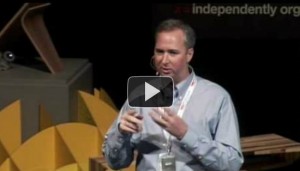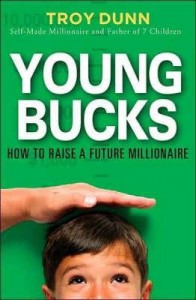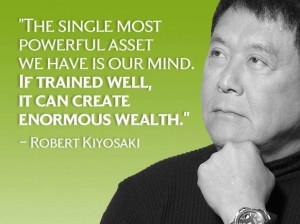I was looking for conversations on Twitter about raising Enterprising Kids, when I came across a very inspirational guy called Cameron Herold. He is a very successful entrepreneur with an excellent message to parents wanting to raise kids to be entrepreneurs. He shares his own life story and makes reference to the book “Young Bucks: How to Raise a Future Millionaire” by Troy Dunn.
Cameron, now in his late forties, was once one of those kids who simply didn’t fit into the regular schooling mould. In fact, these days his hyper-activity would have had him labelled with the disorders of ADHD and Bipolar. Cameron admits that he had, and still has, these “illnesses”, and were he born into this modern world, would have been dosed up on Ritalin and given referrals to the school Psych in order to mould and conform him to expected “societal” standards at school. Cameron explains that it was these afflictions that made him what he is today… a very successful entrepreneur! He says our schools are full of potential entrepreneurs who are suppressed by behaviour programs and Ritalin.
“Bipolar is the CEO disease!”
Steve Jobs, Ted Turner and all three founders of Netscape have two things in common. They are/were successful CEOs AND they all have/had Bipolar.
Cameron says ‘Don’t medicate kids with Attention Deficit Disorders. Imagine if Steve Jobs was given Ritalin, the world wouldn’t have been blessed with the amazing advancements in the technologies of Apple!”
Cameron Herald was brought up by his parents to be an entrepreneur. He points out that schools rarely teach kids how to think like and develop the skills to be entrepreneurs. Schools condition kids to fit into jobs, not build businesses. Cameron wasn’t comfortable with school and ended up dropping out.
Being an entrepreneur is not an inherited trait, but a learned behaviour!
In America, fewer than 18% of households are headed by a self employed business owner, however, self employed business owners are four times more likely to be millionaires than those who work for others! On average entrepreneurs make at least 25% more in income than the general population. (T.Stanley Phd & W.Danko Phd in “The Millionaire Next Door”)
 Entrepreneurs learn to become entrepreneurs through necessity, such as immigrants and refugees, or they learn through observation, such as Robert Kiyosaki. Very few entrepreneurs learn about these skills at school. So, if you want your kids to learn about entrepreneurship, someone in their family must teach it!
Entrepreneurs learn to become entrepreneurs through necessity, such as immigrants and refugees, or they learn through observation, such as Robert Kiyosaki. Very few entrepreneurs learn about these skills at school. So, if you want your kids to learn about entrepreneurship, someone in their family must teach it!
It is interesting to note that 62% of Entrepreneurs say they do not have a family member who is an entrepreneur ((North Eastern University School of Technology Entrepreneurship Oct 2006), so rely on other mentors to teach them the necessary skills.
So how do you teach kids to be successful entrepreneurs?
Cameron Herald offers many excellent suggestions. He presents an outstanding talk, that goes for about 15 minutes. If you are following our blog, then you are likely to be a parent looking to give your children opportunities and choices in life which would include providing them with the know-how to develop enterprise skills. Cameron Herald’s talk is a must see! So go make a coffee, then click this link and soak up his energy and words!
In his talk, Cameron makes reference to a book that he says has practical and age specific advice on how to access your child’s strengths and weaknesses so that you can pre-think ideas to suggest to your children on what kinds of money making opportunities they can do.
The book is called “Young Bucks How to Raise a Future Millionaire” authored by Troy Dunn.
Troy Dunn is also a self made millionaire and successful entrepreneur. He also happens to be a father to seven kids (just like us!), so I guess he is qualified to offer guidance!
In his book he explains that the first pre-requisite is to give your child the “Gift of Want”. They must have a real reason to pursue being an entrepreneur. They must want something badly enough as this is what will give them the motivation to get started and to keep going when the going gets tough!
Dunn leads parents through a series of steps to assist their child in deciding, researching and setting up a money making business. He teaches key concepts like marketing, pricing, negotiating etc and he gives plenty of terrific “enterprise for kids” ideas.
Amazon sell “Young Bucks: How to Raise a Future Millionaire” for $19.95 as a hard copy.
Cameron Herold states that one can change the world as an entrepreneur! All that is needed is a single, brilliant idea.
This takes me to my next point – to be an entrepreneur, we need to change the way we think. True entrepreneurs see obstacles and turbulence in life as opportunities and in the midst of crises often create their own opportunities to solve the problem!
Cameron explains that teaching our kids skills such as leadership, tenacity, sales and attainment, help them to succeed. He says that we need to help them find the entrepreneur within themselves, and we need to make it cool! Kids who struggle at school need opportunity. His view is that we should be raising kids to be entrepreneurs, rather than lawyers! Don’t get me wrong, being a lawyer is an admirable profession, but for those children who have no desire or ability in attaining the results to be a lawyer, then entrepreneurship is even more important.
Cameron thinks parents should groom young entrepreneurs to hate the thought of getting a job! Don’t give kids pocket money as it conditions them to have/expect regular pay cheque. Rather, teach your kids to find things that need to be done around the house, then have them negotiate a fee for doing it. This teaches them to look for opportunities and to negotiate.
Teach kids habits to save. Have them use money boxes with three compartments. One for gifting, one for buying toys and one for buying assets such as money in the bank, gold or stocks.
Take opportunities to teach from real life examples in the real world. For example point out when someone is providing good customer service in a restaurant, or presents well as a salesman. Encourage your kids to sell their unwanted toys, to build inventions and to tell stories to the public.
Cameron Herold has allowed me, as a school teacher, to see kids in schools differently. I can see that there are some children who love the system and are more than happy to get a job and work for a salary, but there are an increasing number of children who don’t fit into the system, and perhaps unknowingly, are destined to be budding entrepreneurs. All they need is someone to release the “entrepreneur self” from within and then provide the opportunities for them to develop!
We need more people like Cameron Herold and Troy Dunn (Young Bucks: How to Raise a Future Millionaire) in our world. If you missed Cameron’s talk, here is the link again!
In our next post I have an invitation for those of you who live in Bunbury Western Australia!









